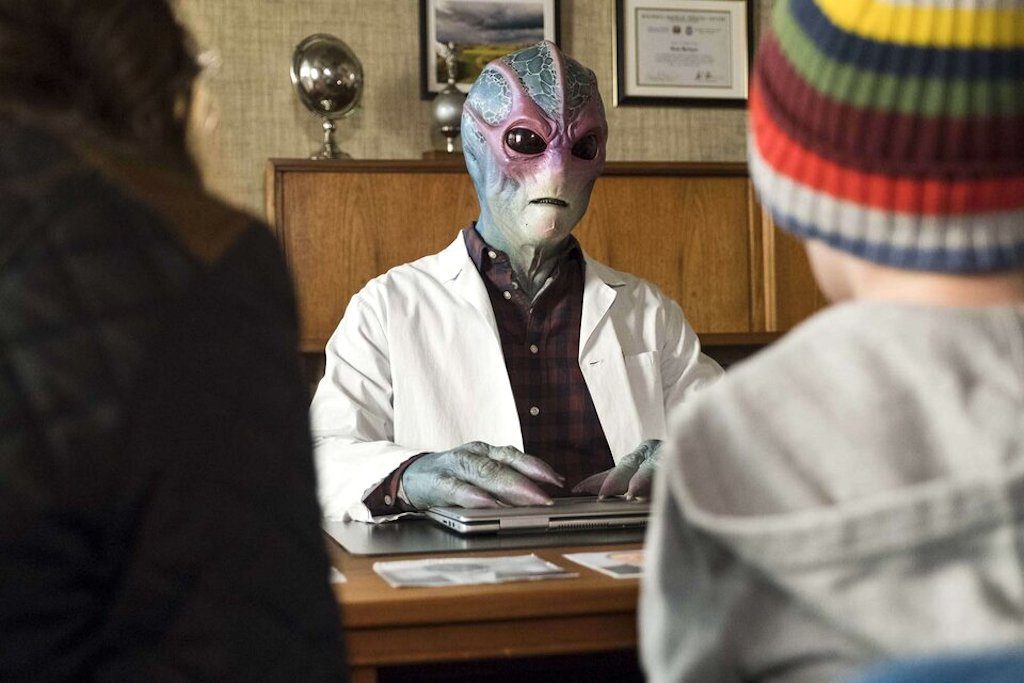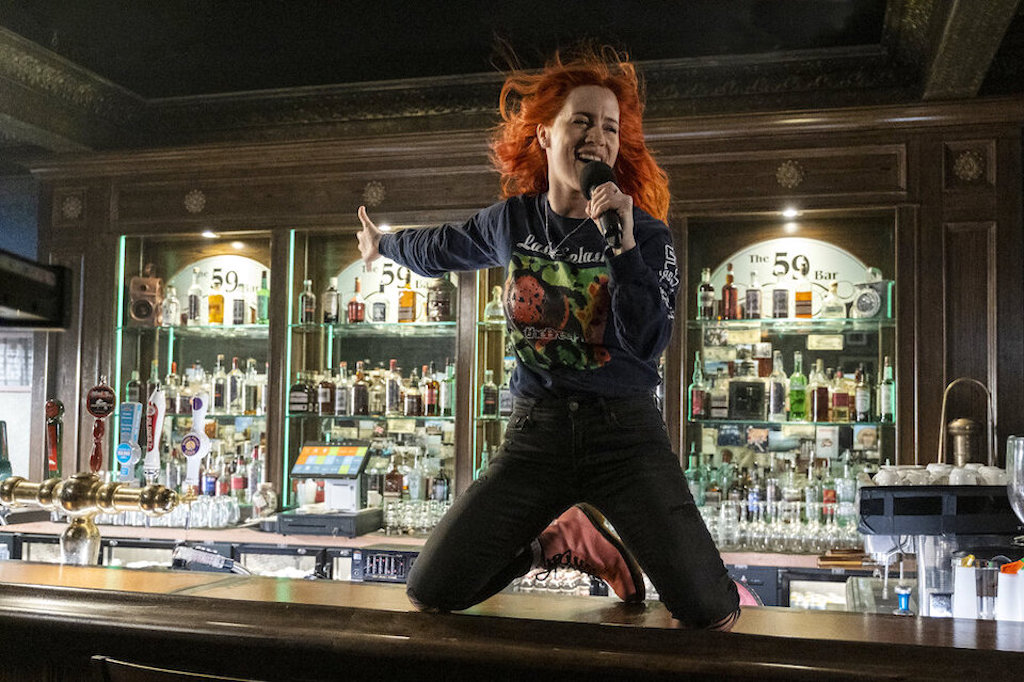“I always wanted to be a writer, but I didn’t know what type of writing I wanted to do,” said Chris Sheridan, who originally thought he wanted to be a journalist until he discovered screenwriting in college. “It immediately clicked.”
“It wasn’t really considered a profession at the time, in the 80s. It was hard to even know what the business was unless you knew someone in it. It was hard to get information. It was hard to get scripts. It was hard to get anything.”
Sheridan read Premiere Magazine for the insight, but also because there were ads to buy scripts for shows like Cheers. “I bought those to see what TV scripts looked like. But when it dawned on me that that was a job, that was the path I wanted to take.”
Sheridan’s writing credits include shows like Living Single, Titus, Yes Dear, Family Guy, and most recently Resident Alien. But, he wasn’t always thinking about a path in comedy. “I hadn’t considered comedy, but one of the bartenders I worked with said he assumed I would do comedy. I had never really thought of it.”

Chris Sheridan
When he moved to Los Angeles, he got a job on a sitcom and then started to navigate within that world. “When I got the job on Family Guy, it was one of the last shows hiring that year. They had a choice between writers who had good samples but bad credits or bad samples and good credits. They ended up choosing good samples, but bad credits and it was the best staff I ever worked on.”
Writing Comedy
“The tough thing with comedy writing today is that so much comedy has been done, so many jokes have been told. It’s easy to fall into the trap of telling the joke people have heard before.” Sheridan continued, “So, if I’m reading a script and I can see a joke where the structure has been done before, but it’s done in a different way, it tells me that the writer knows the form but also knows how to twist it so it feels fresh.”
The writer said rhythm and pace are also vital for comedy writing. “I think it’s all rhythm and knowing where the joke is, depending on what type of comedy you’re doing. Multicam is more presentation. You’re going to want to put the joke at the end.”
“If you’re writing Resident Alien, it’s character-based comedy. People don’t talk [with jokes at the end], so it’s okay to bury the joke a little bit. It’s still funny. It may not be funny, but I’ve noticed on this show, if you put the button at the end, it takes on a sitcom tone and veers away from reality towards a TV reality, which is something different.”
Is it good character comedy or is a character telling jokes?
The goal is to make people laugh, be fast-paced, and be different. “Is it good character comedy or is a character telling jokes? If it’s a character telling jokes, it should be a character who would tell jokes and the jokes better be pretty good. There are so many factors, so many ways to do it wrong, and very few ways to do it right.”
Resident Alien
The story of Resident Alien follows a crash-landed alien who takes on the identity of a small-town Colorado doctor. The adaptation is about a character dealing with the moral dilemma of why he was sent to earth, which was to destroy the planet.
Sheridan’s attachment to the IP came after he started to make a shift towards drama. “Probably eight or nine years ago, I wanted to do cable drama, so I wrote a drama spec pilot that I went out with. I didn’t sell it, but I opened up that world and had to prove myself as a drama writer.”
Pigeonholed as a comedy writer, this drama spec opened up some doors for the screenwriter. In 2015, he was sent the comic book for Resident Alien. “I read it, fell in love with it, and knew I had a take on it right away.” From that point to airing the series, it took about seven years.
Perhaps the most surprising thing about the show is that lead Alan Tudyk (Rogue One, A Knight’s Tale) wasn’t initially attached. “I thought I knew what that character was and I did not know what that character was until Alan Tudyk came through the door.”

Harry Vanderspeigle (Alan Tudyk)
Tudyk was approximately the 110th actor who came in to read for the role, but Sheridan immediately knew he was right for the lead role of Harry Vanderspeigle. “A lot of people were playing it too alien so the reality fell out or they were playing too leading man type and it didn’t feel like he didn’t fit in. Alan did a combination of both, where he was awkward and hysterically funny but had a humanity to him.”
Policing Language
“It was great having Alan on board because he’s a great shepherd of his own character. It took a while to find where the character lives, which is a little bit hyper-real and a little bit different. He’s learning how to be a human, so the comedy comes from that, but you can’t push that too much.”
Occasionally, the balance shifts for the sake of comedy, but Alan’s character learns more and more as the series continues. “It’s got to a great place where he does feel different but everyone accepts him for being a little bit different, which is a theme for the show.”
Alan’s additional credit comes from policing the language of Harry. “Harry is very literal, so in writing Harry, you realize how much as humans come from figures of speech or expressions. I’ve fallen into a trap, even writing in Harry’s voice, where I’ll throw in a figure of speech and Alan will police and say, ‘Harry wouldn’t say that.’”
The same is true for complex words. Harry wouldn’t say complex words when a simple word would work. “Alan has been able to come in and make that comedy consistent. Then, when we go off of it and Harry says something of the time, then it’s funny because we know Harry picked it up watching TV or something.”
Harry’s Journey
As for the plot, the main focus is Harry’s perspective first. “Whatever’s Harry journey is, typically sets the theme for the episode. The one-liner of Harry and Max (Judah Prehn) is that it’s not an alien in a man’s body yelling at a 10-year-old. It’s a man who acts like a 10-year-old yelling at a 10-year-old, so that’s what makes it funny.”
“He’s only been here a year, so he doesn’t know what it means to be human and he has the same sense of humor as a child because those are things that develop over decades. Learning satire or sarcasm. And he doesn’t know those things. It’s fun to play in that world.”
In addition, because Harry is fighting at Max’s level, when a 45-year-old man calls a 10-year-old a “dickhead” it’s funny because it’s unusual. “You forgive him for it because he’s childish. He doesn’t know the difference, so that gives us a pretty big playground to play with.”
“The show was built very purposefully to build up the other characters. This show could live in Harry’s world but I always felt that the show would not survive unless it could also survive in a regular world without an alien. The dynamics have to work on their own, it has to have its own storyline, and it has to work without the alien.”
This way, tossing in the alien layer over top makes it feel like you have something more real. “I feel strongly that if we’re in this journey with Harry and he’s learning to be human, we’re not going to buy that he has fallen in love with humanity or with these people unless we fall in love with them too.”
Intellectual Property
With IP being so important today, Sheridan believes that while IP is of concern, you do have a lot of freedom with it. In Resident Alien, the comic, you only see Harry in the form of Harry’s perspective (he always looks like an alien). In the show, this wouldn’t be as interesting because viewers connect with human emotions. Practically, it’s also expensive.
“I think the goal is to make the best TV show you can. You have to be respectful to the IP, but genres are different, so as good as that comic is, it’s different from TV. It works well as a comic, but things have to change as you switch to TV.” The way they do this on the show is to reveal Harry’s alien head when he sees himself in the mirror.
“I knew it was a big change and I knew fans of comic would not be happy but if you’re making decisions on what will be the best TV show, you have to make changes. You start with 10 episodes but you want to make 50 episodes, so we made the decision to bring Harry to the planet in a darker way.”
Harry initially hated humans and was sent to earth to kill humans. This leads to a longer arc for the character with the possible goal for him to fall for humans, essentially the opposite of Breaking Bad. “I wanted him to look more evil, be more evil, to have an emotional and character place to go.”
“I know what happens when you get to Episode 20, 40, 50, and that you need other characters to play off of. I wanted all of these characters to have enough going on that that itself could be the show. I gave Asta (Sara Tomko) an abusive background. I added D’Arcy (Alice Wetterlund) to the show. She’s not in the comic. She’s more comedic to balance that dark tone. So you try to keep the soul of the IP, but make changes so it works for TV.”
As for advice on getting into the writer’s room today, Sheridan says novice writers should avoid the market. “One year, they’re doing stories about brothers. The next year is female forward. Everything changes. The bullseye is always moving. Don’t make creative decisions about business. Find something you care about that you can tell a story in a way that hasn’t been told before.”
He concluded, “When I approached Resident Alien I didn’t think about blending tones, I just wrote what I thought it would be and what I wanted to watch. This makes it feel more specific and feel a little bit different. In the past 30 years, the scripts that stood out are the ones that felt different than the market.”
This interview has been condensed. Listen to the full audio version here.

